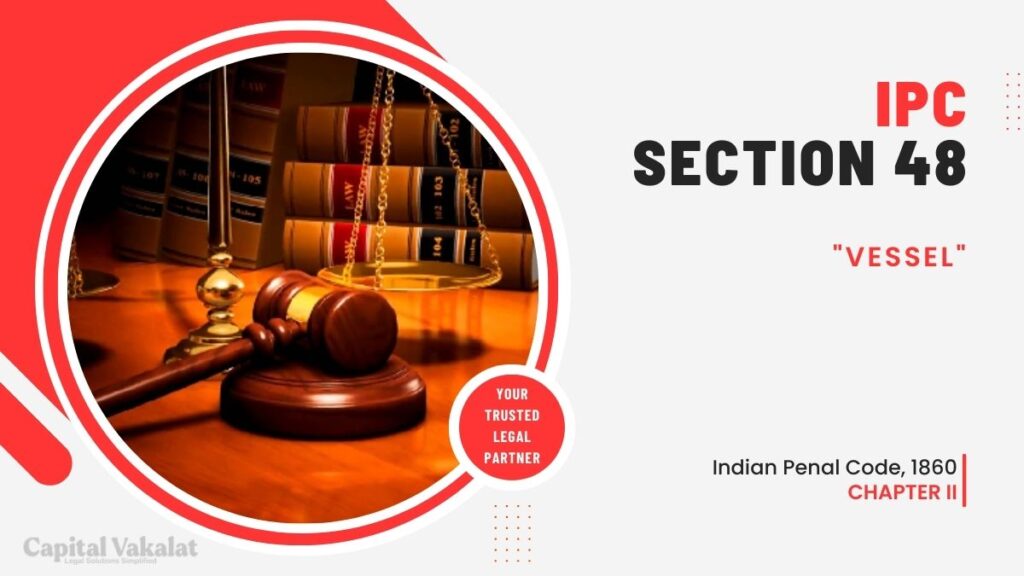When it comes to understanding legal terminologies, the Indian Penal Code (IPC) holds a significant place. One such term that falls under the purview of the IPC is “Vessel.” In Section 48 of the IPC, the term vessel is intricately defined.

This article aims to provide a comprehensive insight into the concept of “Vessel” as outlined in Section 48 IPC.
Introduction to Section 48 IPC
Section 48 of the Indian Penal Code deals explicitly with the concept of “Vessel.” In legal terms, a vessel holds immense significance, as it encompasses various modes of transportation that operate on different mediums.
Defining “Vessel”
The term “Vessel” refers to any conveyance that can transport goods or passengers across various mediums, including water and air. It covers a wide array of transportation modes, ranging from ships and boats to aircraft. Section 48 IPC aims to establish a clear understanding of the term to ensure that legal jurisdictions can effectively regulate and address cases involving vessels.
Types of Vessels
Waterborne Vessels
Waterborne vessels, commonly known as ships and boats, play a vital role in transportation and trade. They can vary in size and purpose, from cargo ships that transport goods globally to fishing boats that support local economies.
Airborne Vessels
Apart from waterborne vessels, airborne vessels also fall under the ambit of Section 48 IPC. This includes aircraft that facilitate domestic and international travel, as well as serve purposes such as cargo transportation, emergency services, and surveillance.
Legal Implications of the Term
Section 48 IPC extends its jurisdiction to cases involving vessels that are not only physically present within India but also those registered in the country. This allows Indian legal authorities to address offenses committed on vessels that are Indian-registered, regardless of their location at the time of the offense.
Offenses Related to Vessels
Offenses related to vessels can encompass a wide range of activities. These include maritime crimes such as piracy, smuggling, illegal fishing, human trafficking, and even cases involving accidents or environmental damage caused by vessels.
Prosecution and Punishment
Section 48 IPC ensures that those involved in offenses related to vessels are brought to justice. The legal provisions outline the prosecution process and the corresponding punishments, which can range from fines to imprisonment, depending on the severity of the offense.
Case Studies
To understand the practical implications of Section 48 IPC, let’s look at a few case studies that highlight instances of offenses related to vessels and the legal actions taken to address them.
Factors Influencing Cases under Section 48 IPC
Several factors influence cases brought under Section 48 IPC. These factors include the vessel’s location at the time of the offense, the type of offense committed, the nationality of the vessel, and the individuals involved.
Role of Authorities
Various authorities, including maritime law enforcement agencies and coast guards, play a crucial role in enforcing Section 48 IPC. Their responsibilities encompass surveillance, investigation, and apprehension of offenders.
Navigating International Waters
Cases involving vessels often extend beyond national boundaries, leading to challenges in enforcement and legal jurisdiction. International agreements and conventions play a role in regulating activities on international waters.
Ensuring Safety and Security
Ensuring the safety and security of vessels is of paramount importance. Section 48 IPC underscores the significance of adhering to regulations that safeguard both the crew and passengers aboard vessels.
Recent Developments
Recent developments in maritime technology, surveillance, and communication have significantly impacted the enforcement of Section 48 IPC. These advancements have improved the efficiency of tracking vessels and addressing offenses promptly.
Challenges in Enforcement
Enforcing Section 48 IPC poses several challenges due to the vastness of the maritime domain, technological limitations, and the complexity of international regulations. Overcoming these challenges requires close cooperation between nations and continuous adaptation to new methods.
Conclusion
In conclusion, Section 48 of the Indian Penal Code provides a comprehensive framework for understanding the term “Vessel.” It encompasses a wide range of transportation modes and scenarios, aiming to ensure justice and security in cases related to vessels. As technology and global interactions continue to evolve, the enforcement of this section remains a dynamic and essential aspect of maintaining law and order in maritime activities.
Certainly! Here are some external resources that provide detailed information about the legal concept of “Vessel” under Section 48 IPC:
- Indian Penal Code – Section 48: Official Indian government website providing the full text of Section 48 of the Indian Penal Code, defining the term “Vessel.”
- United Nations Convention on the Law of the Sea (UNCLOS): Explore the full text of the UNCLOS to gain insights into international laws related to maritime boundaries, navigation, and the rights and responsibilities of states.
- Legal Bites: Legal Bites is a platform that offers articles, case summaries, and resources on various legal topics, including maritime law and IPC provisions.
Remember to verify the credibility of these sources and cross-reference information to ensure accuracy.
FAQs
What types of vessels are covered under Section 48 IPC?
Section 48 IPC covers both waterborne vessels (ships, boats) and airborne vessels (aircraft).
Can cases related to vessels extend beyond national boundaries?
Yes, cases involving vessels can extend beyond national boundaries, posing challenges in jurisdiction and enforcement.
What are some offenses related to vessels?
Offenses related to vessels include piracy, smuggling, illegal fishing, human trafficking, and accidents.
How does technology impact the enforcement of Section 48 IPC?
Technological advancements have improved surveillance, tracking, and communication in the enforcement of Section 48 IPC.